The 79th session of the General Assembly of the United Nations opened this week in New York City. To address some of the main issues on the agenda, with a focus on sustainable development and the Summit of the Future, is John McArthur, director of the Center for Sustainable Development at Brookings and a senior fellow in Global Economy and Development.
Transcript
[music]
DEWS: You’re listening to The Current, part of the Brookings Podcast Network, found online at Brookings dot edu slash podcasts. I’m Fred Dews.
The 79th session of the General Assembly of the United Nations opened this week in New York City. The UN General Assembly, or UNGA, is the policy-making body of the United Nations, and this two-week annual event allows multilateral discussions of a range of international issues.
This year’s UNGA theme is, quote, “Unity and diversity for advancing peace, sustainable development, and human dignity, everywhere and for all.”
Joining me in the virtual studio to address some of the main issues on the agenda, with a focus on sustainable development, is John McArthur, director of the Center for Sustainable Development here at Brookings and a senior fellow in Global Economy and Development.
Before I talk with John, I want to let you know about a new podcast we’re publishing here at Brookings: Democracy in Question, with Katie Dunn Tenpas, who is interviewing guests about American politics and the future of democracy. Learn more about this and our other new and continuing shows at Brookings dot edu slash podcasts.
John, welcome back to The Current.
MCARTHUR: Always great to be with you, Fred. Thank you.
DEWS: Well, it’s been over five years since you’ve been on this show, but less time has elapsed since we worked together on your podcast, 17 Rooms, co -hosted by Zia Khan at the Rockefeller Foundation. So, very happy to see you again.
MCARTHUR: Thank you. We’re thinking about whether to bring that back. So, great to reconnect in any case.
DEWS: All right, can you briefly remind listeners what the Sustainable Development Goals are?
[1:36 ]
MCARTHUR: So, in 2015, all 193 countries who are members of the United Nations agreed on a set of 17 goals for 2030. And these are goals for economic, social, and environmental ambitions. I mean, it’s hard to imagine 193 countries agreeing on anything these days. That’s part of the context for the fall of 2024.
But back then they set a bunch of goals ranging from the elimination of extreme poverty by 2030 to tackling inequality, advancing health, education, jobs, protecting the environment, and crucially goals for peace and partnership around the world. So, they’ve really become since 2015 the framing ambitions of how the world is doing on its biggest common priorities.
DEWS: And you’ve recently written along with Zia Khan that with seven years to go to the 2030 deadline set for achieving the goals that, quote, “the world is far from achieving most of these goals,” unquote. What are some of the indicators that the world is far from reaching the goals?
[2:49]
MCARTHUR: Well, Homi Karas and I and our colleague Odera Onyechi recently actually wrote a piece on this that we published in July looking at how is the world doing. And we applied a few different tests because it’s important to understand that there are different ways to look at the elephant, if you will, of progress or or slowdowns.
And there’s a a common narrative that everything’s going badly. And some things are going badly. If we think about the fight against hunger, for example, the fight against hunger and food insecurity seems to have actually gotten worse since 2015, looking at places that are in conflict in particular, driving that. And there’s been a lot of places around the world that have conflict.
At the same time, if we look at some of the different ambitions like reducing child mortality, we’ve actually seen great success. A million fewer children die every year before their fifth birthday then happened back in 2015. It’s a it’s a huge step forward. And then we see other tests of success though, which are not just “is it getting better or worse?” but is it getting faster or slower when we look at progress? And a lot of the trends when we looked at them kind of before and after 2015 trends, a lot of them are pretty hard to tell the difference. There are some standout successes, which I have to say I was pleasantly surprised by like treating people with AIDS, antiretroviral medicine. This is a problem that 20, 25 years ago was considered too hard to solve globally. It’s the standout success that since 2015 things have been getting better faster than before 2015 in many of the toughest places in the world, places like Democratic Republic of Congo and Sierra Leone and so forth, just extraordinary gains.
At the same time, there’s a whole other set of questions around, well, if the world is like a car driving towards a cliff, the big question isn’t how fast we’re going; the big question is can you hit the brakes in time? And so, we don’t want to be focused on the speedometer if the real issue is avoiding the cliff.
And that’s where a lot of the global environmental issues are a big deal, especially issues like climate change, biodiversity, where there, in the technical jargon, there might be nonlinear thresholds after which you go beyond a point and things get much worse, much faster. So, this is the risk of mass species extinction or major structural changes in in climate patterns around the world.
And that’s where there are lot of indicators where we can’t say with precision how it’s going, but we’re not doing well enough yet to be safe that we’re not going to fall off the cliff in terms of things like environmental management.
DEWS: I’d like to stay on this question of the geopolitical climate and how conflicts like those in Ukraine, between Gaza and Israel, political uncertainty in countries around the world—can you talk a little bit more about how those stand in the way of making progress on some of the goals?
[6:01]
MCARTHUR: Well, one can’t minimize any of the conflicts around the world in terms of the human consequences of them, in terms of the huge number of people dying and the huge numbers of people suffering as a result, or the contentiousness around the world and the division of how people are are seeing these. So, what I’m about to say next is in no way meant to minimize that. But at the same time, what we’re seeing is that a lot of the underlying trends globally on the biggest picture issues on the longer term haven’t changed that much.
And so, what we’re really seeing as a consequence of these massive political tensions, I think, is a huge diversion of attention away from what types of changes are needed to do better on the global challenges of sustainable development.
Because when so many high-level political types are really focused on these issues of conflict, especially in the so-called advanced economies, it makes it a lot harder to say, well, gosh, what what other things do we need to do differently? And that I think is a lot of what we’re seeing is that the the conflicts are, in addition to their direct human costs, are having profound global system costs in terms of people not having the energy or enthusiasm to take on the other big issues that need attention too.
DEWS: I was going to follow up then, and I think you may have just indicated an answer in terms of human costs and system costs. What is at stake if the global community fails to reach the targets set to achieve these 17 goals?
[7:45]
MCARTHUR: Well, Homi and Odera and I looked at some of the trend lines— and we don’t want to offer false precision in this because there’s a bit of a technical debate on how best to extrapolate where we’re going—but when we look at how the world is en route to land by 2030, we see things like more than a billion people left behind without access to basic sanitation. That’s like toilets.
We see, you know, perhaps nearly a a billion people undernourished. We see well over 500 million people in extreme poverty. That’s below $2 a day. This is the poorest of the poor. So, we see hundreds of millions, if not a billion or more, in the most extreme conditions of deprivation.
And this is what I consider an ultimate bottom line, is on issues of life and death we see tens of millions of lives at stake if we measure the difference between current trend lines and what the world’s agreed to do. So, when we did some rough estimates for the next, you know, six years out to 2030, it’s about 34 million additional estimated lives at stake. That’s about a million maternal deaths, about 4 million people losing their lives to traffic deaths, about 10 million children under 5 and importantly about 19 million premature deaths to non-communicable diseases. That’s things like heart disease, cardiovascular, diabetes, and so forth. This is a major killer in a lot of the emerging economies around the world, especially.
And so, you know, that’s a lot of lives, 34 million lives that we don’t get back. And that’s a lot of families losing a lot of loved ones and friends. And so, that’s a huge consequence at stake.
And so, it’s part of why I think one has to be much more than abstract and policy-focused in thinking about these issues. A lot of this comes down to lives at stake, livelihoods at stake and human beings and wellbeing. If we take the notion of “no one left behind,” we have to think about all the specific people who are facing the ultimate cost of being left behind.
DEWS: John, let’s shift our focus then to solutions because in your leadership of the 17 Rooms endeavor and your leadership of the Center for Sustainable Development, and your collaboration with many colleagues, it’s all about solutions, right? So, what are some strategies that we need to accelerate progress toward meeting these Sustainable Development Goals?
[10:30]
MCARTHUR: One of the things that I take away from this empirical study we did is that there’s no single answer across all the Goals. Some things are doing really well, some things are stuck, and some things are moving backwards. And we have to start by assessing the problem of what type of problem is this? Is this about reaching people who are left behind? Is this about support for people in extreme deprivation. How do we need purpose-driven institutions to meet the needs of those people? And that is a huge area of potential learning from something like HIV/AIDS and the global effort there where we have everything from the Global Fund to Fight AIDS, TB, Malaria, the U.S. Presidential Emergency Program for AIDS Relief. We have a pharmaceutical industry developing extraordinary new technologies for drugs. We have the scientific community in major journals around the world doing their bit with weekly debates on how’s it going. And then we have major philanthropies providing a lot of risk capital to do new things.
So, I think we have to look at that and say, well, gosh, that’s a a system and even an ecosystem of actors that are really aligned around these ambitions. And how do we do that elsewhere?
There are other big questions, I think, that are requiring even more stakeholders to think about how we reboot our problem-solving approaches to get more actors together around more types of creativity. And one of the things we found, and Zia and I wrote about, you kindly mentioned it, this piece on rebooting the SDGs, is there needs to be a new approach to problem solving that actually starts with who are the relevant players for the problem at hand? How do we get them together systematically to come up with big ideas that might drive change? And then how do we start with thinking about the demand side of how this is going to work in terms of who’s going to use some potential solution? And they should be in the table from day one.
A big piece of that comes down to financing. Who’s going to pay for this new solution? But we don’t yet have a systematic approach to problem solving that’s anchored in taking the Goals seriously as goals and then pulling together the right mix of stakeholders to deliver on those goals or actors who can really do something about it.
And then crucially starting with, ah, if we actually took seriously a notion of getting this done and brought some ambitious ideas that could motivate bigger action with a degree of boldness, how would that work?
So, that’s what we’ve been trying to learn from in our 17 Rooms process where we really focus on getting mixes of types of people together who could help bring fresh ideas and approaches. But also starting this year, given the way the world is looking, we say, gosh, it’s really time for big ideas too. It’s not just for actions. It’s about big ideas that can inform actions and motivate solutions. And so, that’s a lot of where we’re spending our time right now.
DEWS: And it seems to me that this kind of big idea, ambition should be a topic of discussion at the UN General Assembly?
[13:54]
MCARTHUR: I hope so. I think, and just to be clear, there are lots of people with big ideas. And I think a lot of the time, though, one of the things I am struck by is so many people are immersed in big problems. And so, if we don’t have a way to help people systematically pivot from the big problem they’re confronting to what big ideas and bigger solutions might look like, we’re going to be talking a lot about the problems without making that shift. And there are a lot of big problems.
So, part of what we need to be much more, and we I mean as a global community, be more concerted about is both encouraging and lifting up big ideas and connecting them to the actors who can do something about them, but also making it the job of people who have, you know, large public responsibilities or societal leadership responsibilities to say, gosh, how am I getting the ideas onto the table? What’s my process for generating them and lifting them up? And how do I not just think about government as the place to do this? Governments matter, but they’re just one of multiple types of actors that matter, business, philanthropy, science, civil society, and others.
And so, how do we really bring those fresh ideas that can energize something? I think that’s a big ingredient at this stage when the world often feels pretty stuck.
DEWS: Well, I will put links on the show notes to the two items that we’ve been talking about, “Rebooting the Sustainable Development Goals” and also “How is the World Doing on the SDGs?” again on the show notes.
John, one of the other major activities at this year’s UN General Assembly is the Summit of the Future. What is the Summit of the Future?
[15:38]
MCARTHUR: So, the Summit of the Future is not that well known outside of the UN, but it’s a big deal at the UN. And there’s been a whole history over the past few years of the General Assembly, which is all the member countries coming together, so-called member states, and the Secretary-General, António Guterres, who have had a kind of an ongoing conversation on we need a better system, better UN, we need a better international system to deal with the problems. Clearly, there’s a mismatch. And how do we think through what that better system could look like?
And after a series of big reports by the Secretary-General, “Our Common Agenda,” and so forth, the General Assembly agreed to have a summit this September from 22nd to 23rd. And that is something of a a landmark moment in the aspirations to say, gosh, how could we reform and renew the system? And that includes not just the UN, things like the World Bank, the IMF, other agencies.
And it’s not just a summit of the future, but there’s a draft text called “A Pact for the Future” that they aim to agree on. And also, a couple of subsidiary documents. One is called a “New Global Digital Compact,” where they’re thinking a lot about AI and emerging technologies and a declaration on future generations, where they’re thinking about young people and how to build for the future.
Long story short, this is a bit of a political hot button, hot zone. Here we are just a couple of weeks before the Summit and there’s no agreement yet. It’s a very tricky time in the world. A lot of the world is waiting to see what happens in November in the U.S. elections because it’s so important for how the rest of the world interacts with these questions. But also, it’s just a tough, tough time where hard to get countries to agree in the Security Council, whoever’s in charge. And when there’s a big debate on how do we modernize and update the Security Council? It really makes it tricky.
Then you have to add the layer, which is a pretty deep one, which is for a lot of the so-called global majority in terms of where most of the people live around the world who are based in developing and emerging economies, they care about issues of sustainable development, and these Sustainable Development Goals and the economic cooperation, which they feel isn’t fair and is still dominated by a lot of the rich countries that don’t give equal credence to their concerns.
So, the way I summarize it is a lot of people are trying to protect the rules-based international system, so-called, and a lot of emerging economies are trying to change what they feel is a two-sets-of-rules based international system, one set for the richer countries and another for themselves.
And so, a lot of those debates are really hot going into the Summit of the Future. And we’ll see where it lands. I don’t expect anything transformational in terms of, you know, massive new global agreements. But I do hope that there are a few kind of signposts where people agree on it, some points of follow-up and some emergent norms that could make a bigger difference on how how bigger problem solving happens in the next, say, three to five years.
DEWS: And do you expect to be writing or saying anything about it as as you watch it unfold or afterward?
[19:04]
MCARTHUR: Well, I’m honored, I’ve been invited to present during a so-called SDG Moment that’s happening right afterwards at the UN to share a little presentation on how’s the world doing on the Sustainable Development Goals. So, that’ll be right on the heels of this Summit.
I’m not doing anything within the Summit itself. We’re actually hosting a workshop of the 17 Rooms community on the Sunday the 22nd, but I anticipate that a lot of the discussions during the week of the so-called High-Level segment of the General Assembly—which will include Climate Week for a lot of people who are in climate world, it’ll include all sorts of other issues that people will be debating—I anticipate that whatever happens in landing the plane for the Summit of the Future will affect how people think about the the political climate in the days following.
DEWS: Well, John, we have to leave it there. I want to thank you as always for sharing your time and expertise and also for your leadership in the sustainable development space.
MCARTHUR: Thank you, Fred.
The Brookings Institution is committed to quality, independence, and impact.
We are supported by a diverse array of funders. In line with our values and policies, each Brookings publication represents the sole views of its author(s).


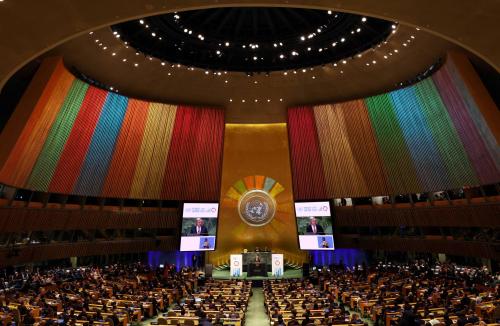
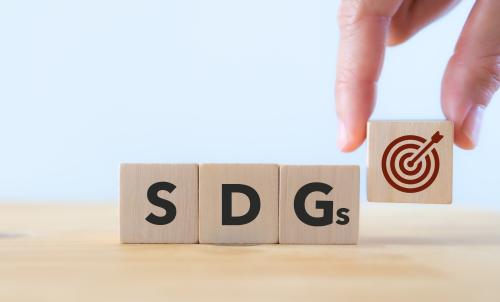
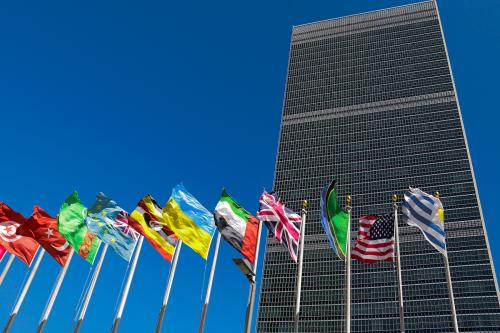

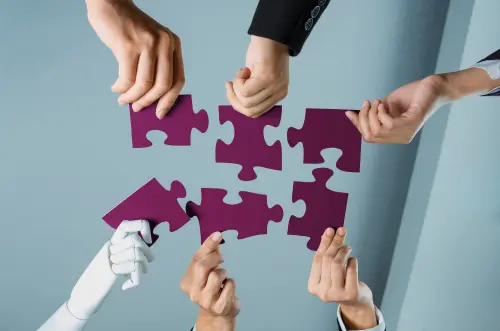
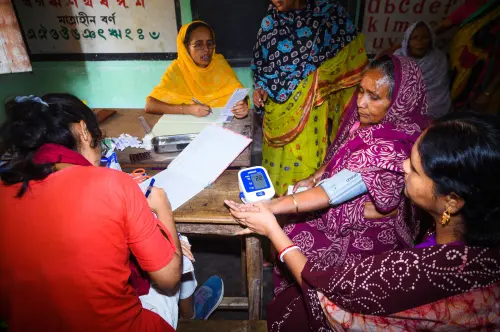
Commentary
PodcastAs the UN General Assembly gets underway, how are we doing on the Sustainable Development Goals?
Listen on
The Current Podcast
September 13, 2024